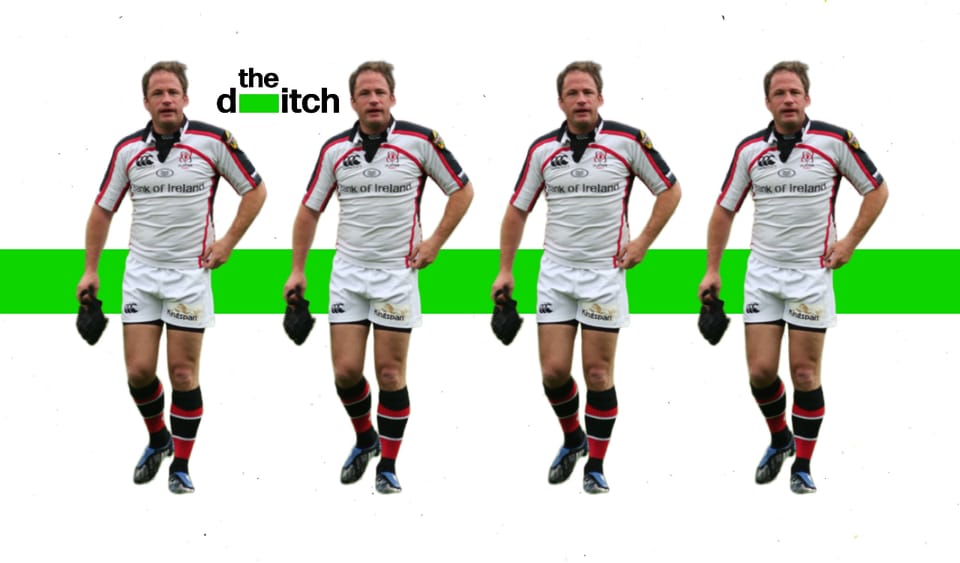For the sake of provocation I’ll say no one wearing the Irish number 10 shirt has synthesised all that makes rugby beautiful like David Humphreys did against the All Blacks in Lansdowne Road in 2001.* Ten minutes gone and he takes the ball flat from Peter Stringer, shows and goes against New Zealand back row Reuben Thorne, hits the jets and leaves him chasing, takes it to the 22 and fixes full back Leon MacDonald, a man with a solid 15 kilogramme advantage on him, draws the hit and perfectly weighs the pop to send centre Kevin Maggs under the posts.
Rugby had only been officially professional six years and the Ballymena ascetic, whose career straddled both eras, was one for the purists, a fly-half who felt the game rather than studied playbooks. His second drop goal that day exemplified this: taking a zipped pass going to his right and first looking to get the backline moving, he instead pulled up and dropped it over, taking the three, with little of the choreography usually required to get your fly-half in place.
I accept what Humphreys did that day doesn’t move everyone. Though I try to be catholic with my taste there are sports I don’t or can’t engage with. They aren’t lesser, just languages I don’t speak. I don’t discriminate. Author Eduardo Galeano learnt to accept who he is: “a beggar for good soccer,” he wrote in Football in Sun and Shadow. “I go about the world, hand outstretched, and in the stadiums I plead: ‘A pretty move, for the love of God.’ And when good soccer happens, I give thanks for the miracle and I don't give a damn which team or country performs it.” I’m a beggar for pretty moves myself and I don’t care what sport they come in.
The more professional rugby got the more it contracted. Data scientists did the sums and concluded bigger men playing boring rugby would return more wins. But even in the northern hemisphere prettiness persists. At Toulon’s Stade Mayol, either side of your halftime pitchside cigarette and without the class division of western Anglophone rugby, you can see Baptiste Serin, a classic French playmaking scrum-half desperately unlucky to play in the time of Antoine Dupont, run and spray the ball with little regard for how sport scientists think rugby should look. At home and also in the Irish 10 shirt Ronan O’Gara’s vision and execution to put Tommy Bowe through with a dink against Wales in 2009; Johnny Sexton, after 41 phases and time up, sending it over against France from 45 metres: two plays that remind grand slam winners can be beautiful.
The good weekend for Irish rugby and great one for Irish soccer just passed brought another round of tedious competition between the two sports. It’s a debate about the politics and values of each sport, as well as how representative they are of the nation, with a little aesthetic analysis of both. Its competitors exclusively favour one and seem less taken with pretty moves than they are with the memberships of their respective clubs.
Rugby could have better spokespeople.
Sometimes you just want to see a pretty move
Newstalk’s Ciara Kelly and the Belfast Telegraph’s Sam McBride are representative of a certain strain of fan who delights in the class composition of the sport and the principles they think are essential to this class.
Ciara Kelly, read a Sunday Independent headline, had no problem “calling them out”, them being those guilty of the “inverted snobbery” of celebrating the rugby team’s quarter-final loss at the last World Cup. “Rugby fans love their sport enough that it more or less prevents them from being cowed with middle-class guilt or middle-class shame – in the way they usually are about most other things,” she wrote. The Belfast Telegraph’s Sam McBride, marvelling at our rugby team that draws from both north and south, has written, “Rugby manages to avoid symbolic disputes in large part because its core support is the middle class, which eschew such rows. Those in the stands self-select, leaving many others out. But a country can’t do that. It has to unite almost everyone to be stable.”
I find it hard to take seriously the idea of rugby and our all-island team as a progressive force or example of what reunification could look like (if only we could all be nice middle class boys who went to nice middle class rugby schools like McBride suggested.) The only times I’ve experienced real sectarianism were in rugby dressing rooms up north. Nothing major, about what you’d expect: jibes about William of Orange and the Battle of the Boyne, jokes about Billy Wright (how’d he end up), casual disrespect of anything Irish. I also find it hard to take seriously the idea that McBride spent any time in these dressing rooms himself.
And to not just ignore class in Irish rugby but to consider its constituency a strength is to misunderstand who’s most harmed by the sport’s exclusivity.
More provocation: Donegal full forward Michael Murphy could’ve been a generational back row or first centre. He didn’t have that choice because he didn’t go to a rugby school. The rugby fans who embrace without irony the hereditary privilege that’s part of the game in parts of the country can’t understand that excluding athletes like Murphy is their loss. (And it’s a loss that maintaining their school cups doesn’t justify – rugby needs the likes of Murphy more than he, with his Celtic cross, needs it.)
What McBride and Kelly share, along with their interlocutors on the other side, is a failure to understand what sport, particularly national sport, is about.
Philosopher Jean-Philippe Toussaint said soccer allows him to be chauvinist, to take part in “a non-duped, second-level nationalism, an ironic nationalism, the oxymoron is perfect, there are no terms that are more antinomian, the charm of the adjective seems to contradict everything displeasing that the word might have, a childish nationalism, of the order of a simple-minded boast, a euphoric, playful fanfare”. Watching or going to a Belgian soccer match he gives “free rein to the impulses of violence and aggression that normally have no place in my personality. I agree to stupidity and ordinariness. I award myself a treat – let's call it a catharsis.”
That catharsis comes through his support of Belgium – not soccer. He recognises you’re supposed to be tribal about teams rather than the sports they play. Sport is of course political, but when the whistle blows they’re just games. And considering any sport purely politically or socially from the left will take you places you don’t want to be: this week Cristiano Ronaldo made his representations to Donald Trump, presumably to secure himself safe passage through the US during the World Cup next summer, his first matches there since 2014; we’re all good Gaels in the GAA – we also share the games with the Free State elite.
Anyway. Sometimes you just want to see a pretty move.
*I told the auld fella I was thinking of writing something that started with a eulogy to David Humphreys’s performance against the All Blacks. After he read the opener he said he’d like a line at the bottom saying he endorses this message. So: the auld fella endorses this message. An Antrim man and former fly-half himself, he’s what the French would call a rugbyman. After last weekend we discussed and praised Mack Hansen and Troy Parrott’s hat-tricks, both great, we said. This is how normal people treat sport.


